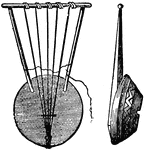Reading the book of Psalms was only slightly more edifying than reading about the psalms. In fact, I may have gotten more out of the latter.
It helped to know that the psalms, essentially prayers in poetic form, number 150 and that they can be divided into five books as follows: Psalms 1-42, 43-72, 73-89, 90-106 and 107-150. The first two books are psalms or prayers related to King David's reign. The last division includes the Songs of Ascents, Psalms 120-134, heretofore completely unknown to me. Psalm 119 has to be the longest psalm and was probably at one time the final psalm before others were added to the book. Most were probably written around 1,000 B.C. or after the Babylonian exile. The authors of the psalms are largely unknown.
The majority of the psalms express cries for help (laments), including somewhat anguished pleas for relief from persecution and unjust accusations, release from suffering at the hands of the wicked and relief from physical pain. They read as personal cries for help, but can also be interpreted as cries on behalf of Israel as a nation. There are psalms of praise and thanks as well and also psalms of 'enthronement.'
The psalms came a bit more alive for me as I noted the various instructions included in the preface to many of the psalms. There was an awful lot of singing and music-making going on in the worship of the ancient Hebrews. I really had never fully grasped that the psalms were written to be sung and to have musical accompaniment. My study bible was always careful to provide an explication for these notes and I've chosen to collect them here:
Asaph: one of Kind David's chief musicians
Gittith: a kind of melody, hence the notation "according to the Gittith"
Jeduthun: one of David's musicians
Korahites: temple singers
Lilies: a melody, hence "according to the Lilies"
Maskil: an artful song, as in artistically composed but still with a instructive message
Muth-labben: musical notation of some kind
Miktam: perhaps a psalm inscribed on a stone wall, hence "a Miktam of David"
Selah: a liturgical or musical direction
Sheminith: a liturgical or musical direction, probably meaning the eighth instrument? and so "according to the Sheminith"
Shiggaion: a lament (and a term I coincidentally heard just recently in a discussion of a contemporary mid-Eastern band)
To the leader: the leader being the musical director and so an instruction to him
I note here some favorite psalms, almost always more beautiful in their King James Version than any other: 8, 21, 22,23 (of course!), 24, 37, 51, 56, 67, 74, 79, 94, 100, 104, 121, 139
